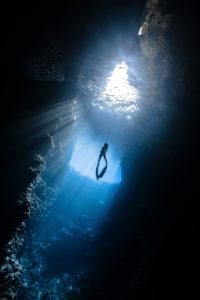Sustainable diving: Leave a positive environmental impact
 The world’s aquatic ecosystems present some of the most beautiful and mysterious places to explore. With the effects of climate change being felt around the world, those who seek these deep places are beginning to consider the impacts we humans are having on these fragile ecosystems. Sustainable diving has become the ethos that guides the actions for those of us who want to make sure that the majesty of these places is there for generations to come.
The world’s aquatic ecosystems present some of the most beautiful and mysterious places to explore. With the effects of climate change being felt around the world, those who seek these deep places are beginning to consider the impacts we humans are having on these fragile ecosystems. Sustainable diving has become the ethos that guides the actions for those of us who want to make sure that the majesty of these places is there for generations to come.
As with all sustainability initiatives, sustainable diving starts with a holistic appreciation for how human activity impacts climate change. Beyond just the impacts of a single diver, sustainable diving is about looking at the entire picture. This means considering everything from the impacts of air travel to reach destinations, to the ethics and practices of local tourism industries, and yes, the individual impacts as well.
It is for this reason that educating oneself on best practices is so important before one starts. Steps like keeping your diving adventures local will help mitigate the impacts of the airline and tourism industry, which will help minimize your individual impacts. This has the added effect of putting pressure on those industries to look for sustainable solutions to their own impacts, which helps advance the global sustainability movement as a whole. With global climates already in flux, even those in colder climates might find a few surprises closer to home than they thought.
Location is only the first step. Once you have decided where you will dive, the next step to making sure you are practicing sustainable diving is to make sure you have the right gear. Gear is important not only in making sure you are safe while you dive, but also because the right gear can help reduce waste. Cheap plastic snorkels and flippers are fun until they break, at which point they just become more plastic waste. It’s better to find good quality gear that will last a lifetime. Sustainable diving gear is more than just flippers or course. Every piece of gear a diver has is essential to maintaining a sustainable practice, but maintaining buoyancy control is one of the most important aspects of diving sustainably.
More important than anything else, a sustainable diver must observe proper etiquette underwater. That’s not just etiquette between humans, but etiquette between humans and the environment we are visiting. Often, new divers will touch fish, corals, and other underwater life through their inexperience or lack of knowledge. Sometimes this is about getting a good photo opportunity, other times it’s pure curiosity. No matter the reason, it is not justifiable unless you are doing so explicitly for scientific research. You could physically harm the organisms you are touching, or cause them to shift normal behaviors which can have wide-reaching and unintended consequences. As COVID-19 has reminded us, you could also be unintentionally aiding the spread of disease in marine ecosystems, which certainly isn’t a sustainable practice.
Sustainable diving etiquette goes beyond just not touching. It’s also important to remember that different ecosystems have different biological diversity, even at the microscopic level. For that reason making sure you have properly maintained your kit is essential in preventing cross-contamination from one ecosystem to another. Make sure you research the dry time needed to ensure you are not accidentally bringing something with you from your last trip.
The movement for sustainable diving is not something that stops at the shoreline. As stated above, sustainability requires a holistic approach if it is to be effective. Just like conservationists realized that to protect one endangered species, they had to protect the entire ecosystem that species rely on, so too must we consider the full impacts we have in our daily lives. The obvious steps, such as limiting or eliminating our use on single-use plastics, or not littering have already generated popular appeal to the point that governments are beginning to look into legislation around them. Other steps, like forgoing seafood and limiting travel are slower to be adopted.
This is intuitive – seafood is healthy to eat, and to learn and experience it we must travel. Why should we stop these activities? Moreover, fishing and tourism make up huge parts of some national economies, and so any call to stop buying into those industries might be construed as an attack on that nation, and the people who rely on those industries to survive. In the long run, however, sustained overfishing will lead to ecosystem collapse. We know this. It has already happened in some places. Our reliance on fossil fuels for travel has led to a direct increase in the global climate, which is causing acidification in aquatic ecosystems. This is why sustainability efforts must be holistic and accessible. It starts with each of us doing the right things individually and educating others to do the same, but it can’t stop there.
 Casper Ohm is the editor-in-chief at Water-Pollution.org.uk, an outlet intended to raise awareness of the alarming levels of water pollution in our planet’s oceans. When he isn’t scuba diving and collecting data in the far corners of the world, he lives in New York with his family.
Casper Ohm is the editor-in-chief at Water-Pollution.org.uk, an outlet intended to raise awareness of the alarming levels of water pollution in our planet’s oceans. When he isn’t scuba diving and collecting data in the far corners of the world, he lives in New York with his family.
Linkedin: https://www.linkedin.com/in/casper-ohm-9a14b3133/
Twitter: @casper_ohm


Sorry, the comment form is closed at this time.